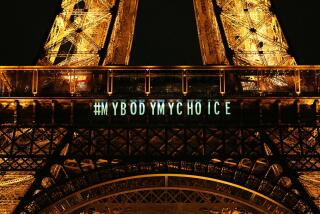Head Scarves in France: a Non Issue
- Share via
France has agonized for years about whether and how to discourage Islamic girls from wearing the hijab, or head scarf, in public schools -- something more and more students have taken to doing, claiming religious obligation, fashion or simply that it’s a matter of individual rights.
It is a practice that has grown more confrontational as European and American relations with the Islamic world have worsened. And, though there are no doubt lots of pious young women, many others have reported that the covering they don is imposed by males, sometimes enforced by gang rapes. In the tough French suburbs, some young Muslim women have formed support organizations for safety and in protest against those who insist that they be covered. Scarf wearing is also ordered by mullahs who fear the influence of secular French society on “their” women.
Thus the issue has become, in large part, who controls women? Are they subject to French laws -- and the deeply held principle of church-state separation -- or to their fathers, husbands, brothers and mullahs? Are they free? And a second issue is even broader: Do religious citizens of a democratic country owe first service to their religion or their nation?
French disapproval of customs they see as endorsing a subservient position for women is very deeply felt. France, like other countries, has outlawed female circumcision and other injurious practices, and it punishes acts that express attitudes offensive to the majority of the community, for instance the defacement of Jewish cemeteries.
Of course, a head scarf per se is harmless, but it can also be seen as an impediment to the assimilation of Muslims into French society and especially to the social equality of women. And if the government were to accede to the demand that women be allowed to wear them, it might create a slippery slope. Tension over Islamic demands that French society honor Muslim religious customs has arisen not only in schools but also in hospitals, where Muslim women, or their husbands, object to them being treated by men. It has surfaced also in universities and at public swimming pools, where some Muslims demand that men and women be segregated.
The French government felt it urgent to do something about direct challenges to the separation of church and state, a principle hard won after a protracted struggle with the Catholic Church that was resolved only in the early 20th century.
A commission of “sages” was appointed to study the head scarf situation, and it listened to arguments against the ban: People should be allowed to practice their religion unimpeded by government; girls would perhaps not go to school if the hijab were banned; or, in a spirit of rebellion, more and more would take up wearing scarves. Religious figures, educators, philosophers and the like were heard from, and the sages finally came down on the side of banning from schools and public places like hospitals all religious symbols -- visible crosses, yarmulkes, turbans and the hijab. To Americans, this is apt to sound controlling, even an extreme infringement on free speech. But most French are in favor of the ban, seeing this as a dress code issue.
The American press, always ready to criticize France, was quick to comment on what it saw as French religious intolerance, and the U.S. State Department, defending the freedom of religious expression as long as it is “without provocation or intimidation,” seems to have missed the point. At bottom, the conflict is less about religion, or personal rights, than about which comes first: the duties of a citizen to his religion or to the civil law?
We Americans deal with this all the time: Think of the judge in Alabama and his monument to the Ten Commandments, or the ongoing struggles over prayer in schools, or whether towns can put up Christmas trees. American courts have ruled that worship is private, and public spaces should remain secular, but this principle is always under attack and being redefined.
In the aftermath of President Jacques Chirac’s decision to call for a direct ban on religious symbols in public places, the range of opinion, in France and in the rest of the world, has made for strange paradoxes: the pope defends the Islamic head scarf (maybe he’s thinking about nuns’ veils); many moderate Islamic leaders in France favor the ban on the grounds that it will combat the rise of Islamic fundamentalism and the increasing economic marginalization of French Muslims arising from French antipathy. Most recently, a moderate Sunni leader in Egypt, Mohammed Sayed Tantawi, pronounced that Muslims have a duty to obey the laws of the countries they live in. In the light of all this, American criticism of the ban may have been somewhat hasty.
To me, the reasons for the ban in the name of civic polity seem to outweigh those against it in this issue mined with insincerity and coercion.
But the ban will come with a price. France and Chirac, who have thought themselves liked by the Arab countries, may have shifted to the side of the enemy in Islam’s mind.
Diane Johnson is the author of the novel “L’Affair” (Dutton, 2003).
More to Read
Sign up for Essential California
The most important California stories and recommendations in your inbox every morning.
You may occasionally receive promotional content from the Los Angeles Times.










